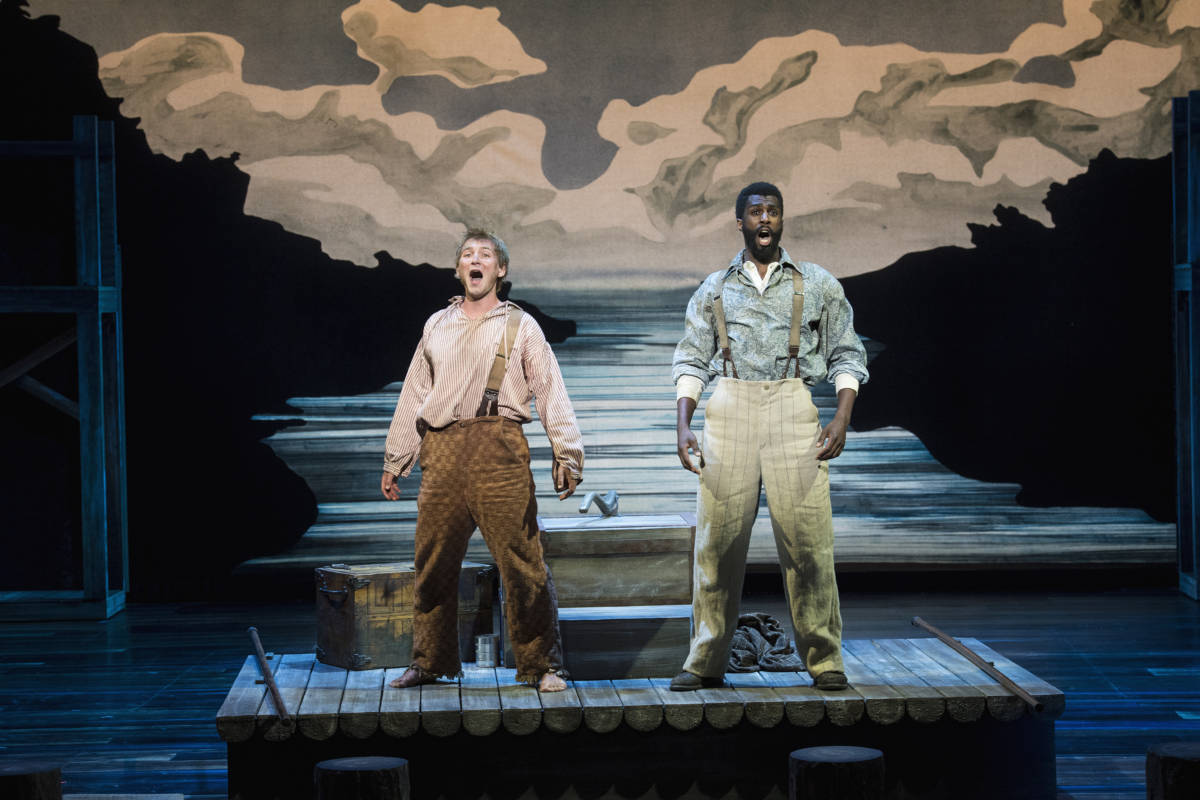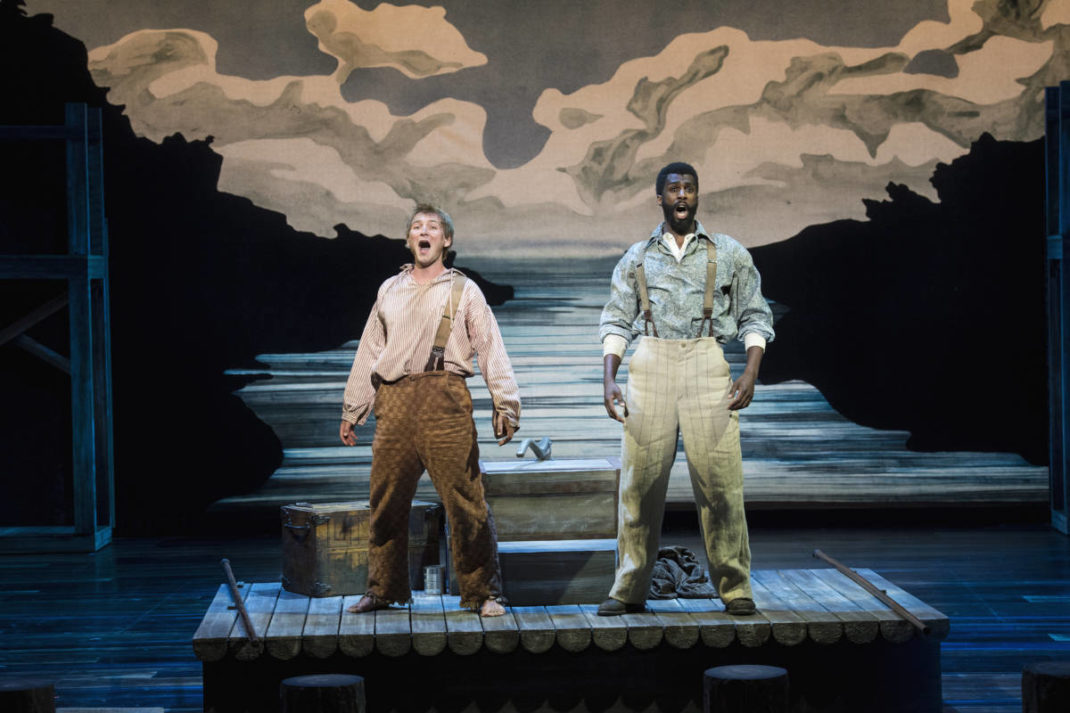
Utah Shakespeare Festival’s “Big River” is delightful but sobering
There’s a lot to love in the Utah Shakespeare Festival’s production of the musical “Big River.”
Fun and soulful songs, high adventure, teenage mischief, abolitionism, and Mark Twain — really, we could stop the review right there and you’d have a pretty good idea about what’s in store with this musical adaptation of Twain’s “Adventures of Huckleberry Finn” with music and lyrics by the late singer-songwriter Roger Miller (“King of the Road,” the soundtrack to Disney’s “Robin Hood”) and book by William Hauptmann.
Twain and Miller are a match made in heaven, and director Melissa Rain Anderson lets the boys do their thing, trusting in Twain’s language, which often shines through in Hauptmann’s script, and Miller’s tunes, which manage to do the nearly impossible as they stand up proudly alongside Twain’s dialogue.
Like the book, “Big River” is Huckleberry Finn’s first-person account of running away with Jim the slave, facing danger, persecution, and all sorts of scoundrels along the way. Yet it’s also a charming tale of friendship, family, and humanity.
Miller’s score immediately sets the mood with its Appalachian bluegrass overture, leading right into the catchy “Do You Wanna Go to Heaven?” By the time the brilliant John Ahlin — in character as Huck’s father, Pap Finn — barges through his drunken “Guv’ment” song, it’s obvious that the musical component of this production is going to be solid.
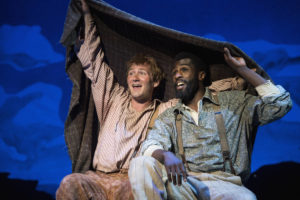
Luckily, the dialogue and acting manage to keep up. Rob Riordan is utterly charming as Huck, bringing the same boyish good nature to the role that he does as Ellard Simms in “The Foreigner,” also at this year’s festival.
Michael Doherty, who is so perfectly suited to the role of Charlie Baker in “The Foreigner,” takes on Tom Sawyer in “Big River.” While his elastic face and the resulting expressions are spot-on for Charlie, they do seem a bit over-the-top for Tom. Still, his featured song, “Hand for the Hog,” is a riot.
Even though Tom Sawyer does play a prominent supporting role in the musical, it’s more about Huck’s relationship with Jim, the runaway slave. And Ezekiel Andrew is nothing but superb as Jim. “Big River” is technically Huck’s story, but it’s Jim who is at the heart of the tale.
To hear Jim speaking frankly about how he’s worth $800 is a stark reminder that people used to own other people in this country. This evil practice was commonplace for more than 200 years.
While Andrew’s demeanor as Jim — friendly, loyal, and heartbroken — is handled expertly, what you’re most likely to remember is his voice. He has an absolutely gorgeous, soulful baritone. And after he finishes singing for the first time, on “Muddy Water,” the audience erupts in applause — even whistling like they are at a rock concert.
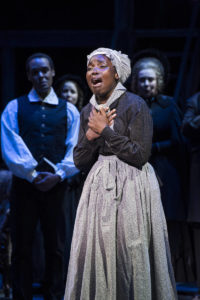
It’s not just Andrew’s voice that brings beauty to the production. Scenic designer Jason Lajka (who also did a fabulous job with the scenery for “The Foreigner”) has created a stunning river mural as the backdrop for this journey down the Mississippi. It’s perfectly suited for both “Muddy Water” and “The Crossing,” an ethereal slave song highlighted by Daria Pilar Redus’s spectacular vocals.
Then, when you think it couldn’t get any better, Andrew and Riordan treat us to “River in the Rain” as fireflies light up around the stage and we hang on every note from Andrew’s mouth.
After intermission, The King (Chris Mixon) and The Duke (Jim Poulos) lighten the mood with the unabashed delight of “The Royal Nonesuch,” and the Young Fool (Austin Glen Jacobs) delivers the addicting “Arkansas.” But in the midst of the nonsense, sobering narratives remain.
Andrew and Riordan sing “Worlds Apart,” which is strikingly similar to Shylock’s “Hath not a Jew eyes” speech from “The Merchant of Venice” in its message of finding commonalities in spite of differences. Then Otim brings the heavens down to earth with her fabulous vocals on “How Blest We Are.”
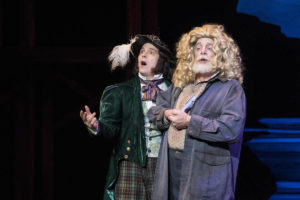
The superb music continues as the Wilkes Sisters — Mary Jane (Samantha Allred), Susan (Katie Fay Francis), and Joanna (Cailen Fu) — sing “You Oughta Be Here with Me” in their lush and lovely three-part harmony. This powerful song envelopes a hopeful message: “People reach new understandings all the time / They take a second look, maybe change their minds.”
Among those reaching a new understanding in this story is Huck, who ponders how human beings can be “so cruel to each other” and then confesses to becoming a “dirty abolitionist.” He’s been taught that helping slaves to escape is a bad thing to do. The laws of cruelty are right, and human decency is wrong. As we know, history tells a different story, and Huck lands on the right side of history as he decides to follow his heart and help his friend.
Because most people now realize that persecuting and enslaving another race is unquestionably wrong, the audience is right there with Jim in his moment of triumph, the luscious textures of Andrew’s voice rising triumphantly as he sings the soaring “Free at Last.”
The Utah Shakespeare Festival’s production of “Big River” continues through Sept. 1 in the Randall L. Jones Theatre at Southern Utah University’s Beverley Center for the Arts in Cedar City. Tickets are $32–$75. Visit bard.org or call (800) 752-9849.
Editor’s note: A previous version of this review incorrectly named Veronica Otis as the vocalist who performed “Muddy Water” and “The Crossing.”
Articles related to “Utah Shakespeare Festival’s ‘Big River’ is delightful but sobering”
Utah Shakespeare Festival’s “Henry VI, Part One” is flawed, but Joan of Arc sizzles
Get your Falstaff on with “The Merry Wives of Windsor” at the Utah Shakespeare Festival
“The Foreigner” battles hatred with farce at the Utah Shakespeare Festival

